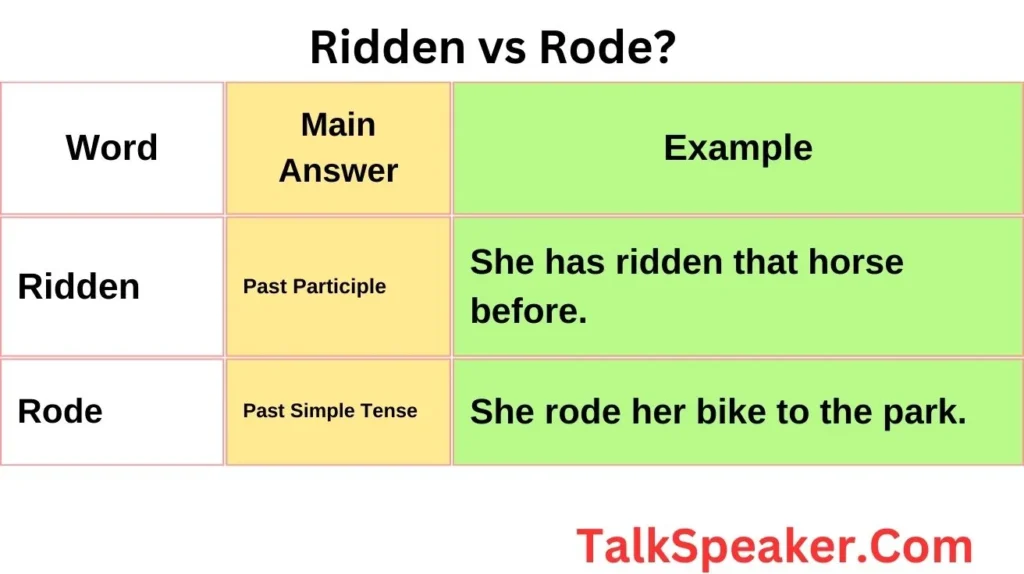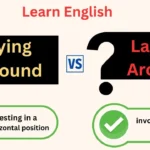Understanding the correct usage of “ridden” and “rode” is essential for mastering English verb tenses.
Use “rode” for the past simple tense and “ridden” as the past participle with perfect tenses.
This blog post will delve into the intricacies of these verb forms, offering detailed explanations, practical examples, and tips to avoid common mistakes.

Ridden vs Rode? Use And Example
| Verb Form | Usage | Example |
|---|---|---|
| Ride | Infinitive/Base Form | I want to ride my bike. |
| Rode | Past Simple Tense | She rode her bike to the park. |
| Ridden | Past Participle | She has ridden that horse before. |
The Basics of English Verb Tenses
English verb tenses can be complex, but they follow specific rules.
Let’s start with an overview of verb tenses to build a strong foundation.
Overview of Verb Tenses
English verbs are divided into three main tenses:
- Present
- Past
- Future
Each tense can further be categorized into four aspects:
- Simple (e.g., I write, I wrote, I will write)
- Continuous (e.g., I am writing, I was writing, I will be writing)
- Perfect (e.g., I have written, I had written, I will have written)
- Perfect Continuous (e.g., I have been writing, I had been writing, I will have been writing)
Understanding Verb Forms: Infinitive, Past Simple, and Past Participle
Verbs have different forms depending on their usage in sentences. The main forms include:
- Infinitive (base form): “to ride”
- Past Simple: “rode”
- Past Participle: “ridden”
What Is an Infinitive Verb?
An infinitive verb is the base form of a verb preceded by “to.” It is used in various ways, such as:
- As the subject of a sentence: To ride is fun.
- After certain verbs: I want to ride.
- To express purpose: She went to the store to buy groceries.
Past Simple Verbs in Action
The past simple tense indicates an action that happened at a specific time in the past.
For example:
- Regular verbs: walk – walked, play – played
- Irregular verbs: go – went, ride – rode
Examples:
- She rode her bike to the park.
- They rode horses during their vacation.
The Role of Past Participles in English
Past participles are crucial in forming perfect tenses and the passive voice.
They are often used with auxiliary verbs like “have” or “be.”
Examples:
- Present Perfect: She has ridden that bike many times.
- Past Perfect: They had ridden through the forest before.
- Passive Voice: The bike was ridden by many children.
Ride, Rode, Ridden: Identifying the Correct Usage
Understanding when to use “ride,” “rode,” and “ridden” is key to correct grammar.
Here’s a breakdown:
- Ride: Infinitive and base form.
- Examples: I want to ride my bike. They will ride to the beach.
- Rode: Past simple form.
- Examples: Yesterday, she rode her bike. They rode horses on their trip.
- Ridden: Past participle form.
- Examples: She has ridden that horse before. The bikes have been ridden by many children.
Common Mistakes and How to Avoid Them
People often confuse “rode” and “ridden.” Here are common mistakes and tips to avoid them:
Common Mistakes
- Incorrect: She has rode her bike.
- Correct: She has ridden her bike.
- Incorrect: They have rode through the forest.
- Correct: They have ridden through the forest.
Tips to Avoid Mistakes
- Remember, “rode” is used for the past simple tense, and “ridden” is used with perfect tenses and the passive voice.
- Practice with sentences to reinforce correct usage.
- Read and listen to native English to see these verbs in context.
Using ‘Rode’ Incorrectly
Let’s look at examples of incorrect usage and correct them:
Examples of Incorrect Usage
- Incorrect: She has rode a horse.
- Incorrect: They have rode to the beach.
Correcting Mistakes
- Correct: She has ridden a horse.
- Correct: They have ridden to the beach.
Practical Examples to Demonstrate ‘Ridden’ and ‘Rode’
Here are real-life examples to illustrate the correct use of “ridden” and “rode“:
Examples with ‘Rode’
- Yesterday, he rode his bike to school.
- She rode the roller coaster five times.
Examples with ‘Ridden’
- She has ridden that horse before.
- They have ridden in the same car.
Table: Quick Reference for Ride, Rode, Ridden
| Verb Form | Usage Example |
| Ride (Infinitive) | I want to ride my bike. |
| Rode (Past Simple) | She rode her bike to the park yesterday. |
| Ridden (Past Participle) | She has ridden that horse many times. |
Conclusion
Mastering the correct usage of “ridden” and “rode” is essential for clear and accurate communication.
By understanding the rules and practicing with real-life examples, you can avoid common mistakes and improve your English skills.
Additional Resources
- Grammar Guides and Exercises
- Perfect Tense Practice
- Past Participle Guide
By following this guide, you’ll be well on your way to mastering the use of “ridden” and “rode” in your everyday language.
Keep practicing, and don’t hesitate to refer back to this article whenever you need a refresher. Happy learning!

Amelia Harris, a passionate educator, simplifies English grammar and vocabulary for learners of all levels. With her engaging style, mastering English has never been easie




